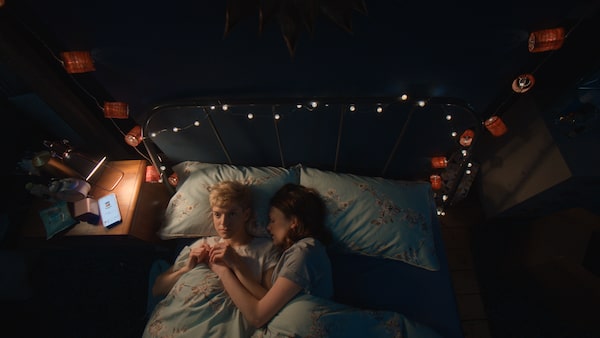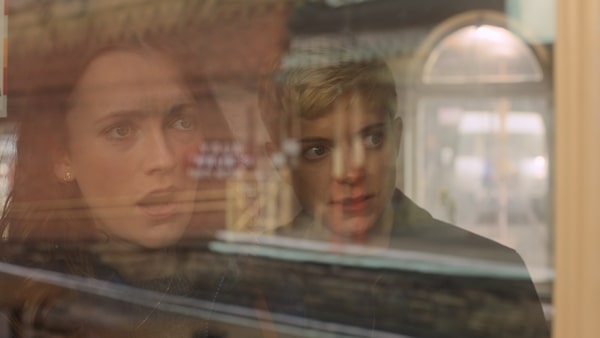
Feel Good, created by and starring Mae Martin, left, just began airing on Channel 4 in Britain, and has been receiving rave reviews.Courtesy of Netflix/Netflix
The title Feel Good sounded promising. After all, what we need is something to make us feel good in these petrifying pandemic times.
Then I looked into the gist of it. The name Mae Martin rang a bell but only vaguely. Martin, last seen in these parts as a name on the writing credits for CBC’s Baroness von Sketch Show, was, I think, a star of the Canadian stand-up scene when she was a teenager. Then, apart from writing for Baroness, she seemed to disappear.
Most Canadian comics with ambition and fortitude head for Los Angeles. Martin went to England. She did stand-up and got rave reviews. She went from cult figure to more renowned mainstream star through shows on BBC radio. (It would appear from her confusing bio that as she was succeeding in Britain, she was also writing for Baroness.) This Canadian you might never have heard about is, in a word, huge. Over there, anyway.
Feel Good (now streaming on Netflix), which she created and stars in, just began airing on Channel 4 in Britain. Reviews have been gushing. It’s been called “a glorious, shining jewel” and “a masterpiece.” Phew.
Well, it’s not a masterpiece, but it’s fascinating. It’s a romantic comedy with a dash of drama and a fair amount of fast, surreal humour. Semi-autobiographical, it features Mae as a version of herself, a queer stand-up comic who falls heavily for her new girlfriend, George (Charlotte Ritchie), who has never had a same-sex relationship before. The engine that drives the surface action and energy is that mad, passionate feeling of head-over-heels romance. They can’t get enough of each other.

Semi-autobiographical, Feel Good features Mae as a version of herself, a queer stand-up comic who falls heavily for her new girlfriend, George (Charlotte Ritchie, left), who has never had a same-sex relationship before.Courtesy of Netflix/Netflix
Then there’s a hitch in all that hot love. George realizes that Mae has a history of substance-abuse problems and probably should be going to Addicts Anonymous meetings instead of showering her with giddy affection. Also George is a tad reluctant to introduce Mae to her friends and Mae frets that this is either because she’s reluctant to admit she’s in a serious lesbian love affair, or because Mae’s an addict. Or both.
The six-part series moves at a frantic pace. At times, it’s hilarious. Mae’s antics at AA meetings and those of her pals in the group amount to deftly done farce. There are, mind you, several issues fighting for attention in the madcap-comedy part of things. The George character is figuring out her sexuality and that’s a significant thread. Mae is trying to come to terms with her history of outrageous behaviour and being utterly unreliable when addicted. This plays out nicely in scenes with her parents. Her mom is played by Lisa Kudrow, who can time an acid remark like few others.
Mainly, Feel Good is about addiction and how love is a narcotic just like any other addiction, fixation or dependence. Making that funny isn’t an easy task, and sometimes the series is straining to make dubious assertions comical enough to be easily consumed. In the end, Feel Good is less about romance than it is two people talking about romance as an enslavement that can be compared to drug addiction.
Martin is one compelling figure – and, yes, she sometimes plays up her Canadian roots – and one can see the reasons for her appeal in Britain. She’s direct, concise and puckish. Intriguing as it is, mind you, Feel Good feels deliriously British and is not a fun time for every viewer.
Finally, at the suggestion of many readers, this column continues with a “Stay-at-home-period daily streaming pick” for the next while. Today’s pick is The Beautiful Lie (CBC Gem). It’s a stunningly good drama series from Australia and heartily recommended. The six-part series is about doomed love. How do we know it’s doomed? Because it is a modern adaptation of the central story in Tolstoy’s Anna Karenina, set in modern, upper-middle-class Melbourne.
The visceral emotional weight of it is intense. And then there’s the excellent cast, with the (doomed) lead played by Sarah Snook, who is familiar as Siobhan (Shiv) Roy, the dangerously mercurial daughter of media mogul Logan Roy on HBO’s Succession. She’s wonderful here as the Anna-figure who falls hopelessly, ecstatically and tragically in love with an unsuitable younger man. It’s addictive, this thing, and you need neither a weakness for stories of doomed love, nor knowledge of Tolstoy’s novel to savour it.
Plan your screen time with the weekly What to Watch newsletter, with film, TV and streaming reviews and more. Sign up today.